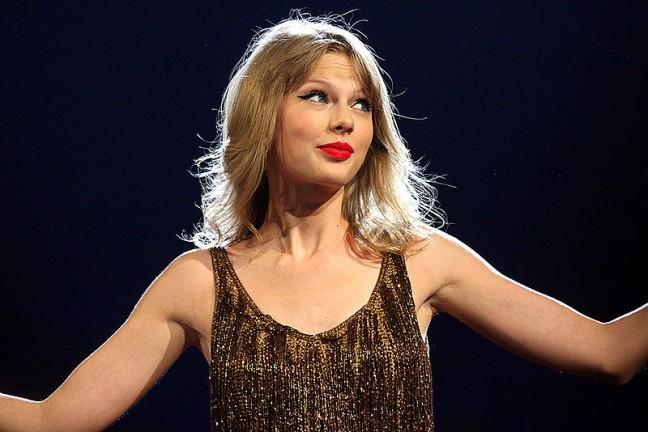It was the shade-throwing felt around the world. Taylor Swift, pop star, cat lover, New York City wannabe and designer handbag holder, removed all her albums from the popular music streaming application Spotify, Nov. 3. To the approximately 50 million users of Spotify, 12.5 of which pay for the service, it was a metaphorical burn that would certainly require some aloe vera.
The abrupt extraction occurred after her newest album, 1989, sold 1.3 million copies in its first week. In an interview with Yahoo, Swift referred to Spotify as a “grand experiment” and explained her motives, “… I’m not willing to contribute my life’s work to an experiment that I don’t feel fairly compensates the writers, producers, artists and creators of this music. And I just don’t agree with perpetuating the perception that music has no value and should be free.”
President of Big Machine Label group and representative for Swift, Scott Borchetta, also defended her decision, “If this fan went and purchased the record, CD, iTunes, wherever, and then their friends go, ‘why did you pay for it? It’s free on Spotify,’ we’re being completely disrespectful to that superfan.”
Between Swift herself and Borchetta, two main arguments seem to emerge. Swift cites the artists themselves as the victim of streaming services; their musical creations, molded lovingly in recording studios across the globe, are cheapened and disrespected by streaming services “perpetuating the perception that music has no value and should be free.”
This argument founded on defending music’s dignity is not a new one and has been taken up by several artists including Radiohead’s forever-angst-troll Thom Yorke. I find this to be a hollow declaration; while music and it’s creators should be revered and appreciated, compensation is not the only way to do so.
American rapper Hoodie Allen challenged Swift’s decision on these grounds Nov. 6 via several tweets, “I respectfully disagree with artists who take their music off Spotify/ Streaming does not equal stealing. Fan loyalty will drive ticket sales, albums and merch sales and music discovery will grown you even bigger/ Let’s stop pretending Spotify is ruining the music industry in a world where people charge $500 for group picture meets.”
Let's stop pretending Spotify is ruining the music industry in a world where people charge $500 for group picture meet & greets. STFU lol
— Hoodie Allen (@HoodieAllen) November 7, 2014
Allen’s argument is particularly relevant for Swift, who has a net worth of $200 million and allegedly would have made $6 million on Spotify. If compensation is truly the indicator of musical dignity for the artists, then she is already half-way to demigoddess status. This is true for many other artists as well, seeing as Spotify has given back $2 billion to labels, publishers and collecting societies for distribution to songwriters and recording artists since the service’s launching in 2008.
Swift’s declaration is further undermined by other well-known artists using opposite tactics to get people to listen and enjoy their music. Back in September, famed rock band U2 infamously dropped their latest album, Songs of Innocence, into over 500 million iTunes accounts, free of charge and without a consensual download from owners of these accounts.
While it was an extremely controversial move and condemned by many users, frontman Bono earnestly explained the decision while also apologizing for his presumptuousness, “I had this beautiful idea and we got carried away with ourselves … A drop of megalomania, a touch of generosity, a dash of self-promotion and deep fear that these songs that we poured our life into over the last few years mightn’t be heard.” While the method was too drastic, the act itself quantified music appreciation through listening, rather than money.
Borchetta’s second argument stems from Swift’s. He defends the “superfan,” a devout apostle of Swift who follows all her social media portals, attends every concert in a ball gown and has said things like, “Harry Styles was so mean to Tay-Tay, and he’s not even hot.” According to Borchetta, this superfan’s devotion is insulted by Swift’s use of streaming services, taking away the inconvenient (and essentially money-making) channels through which one proves their loyalty.
Borchetta’s “superfan” argument sites compensation as the key characteristic of a true fan. As an avid Spotify user myself, paying $5 a month as a college student, I find it insulting that the only way I can proclaim my love of an artist is by paying for their music. Yes, it is important to financially support a music group that you like. However, as referenced by Hoodie Allen, one can purchase concert tickets, merchandise and pursue many other ways to compensate bands they like. I have personally discovered many bands, and have thus respected and listened to their art, through Spotify.
Spotify is an infrastructure where artists, both known and unknown, can display their music for the masses. It is far more beneficial to both listener and artist than torrenting websites or YouTube. Furthermore, Spotify’s intention is to provide music while also giving back to the source. It is still a very new, imperfect service and will have to evolve over time. However, Swift’s rejection of it is money-grovelling sugarcoated in fluffy moral assertions.


